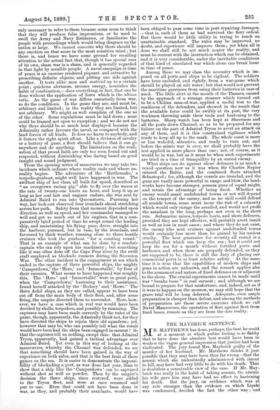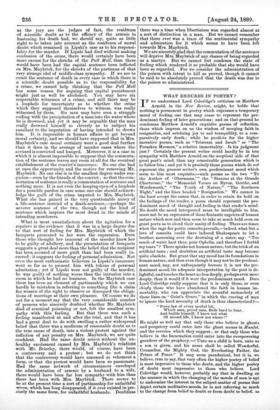THE MAYBRICK SENTENCE.
NI-1R. MATTHEWS has done, perhaps, the best he could at a moment at which public feeling is so flabby that to have done the absolute best would have been to weaken the vague general impression that justice had been vindicated. The jury found Mrs. Maybrick guilty of the murder of her husband. Mr. Matthews thinks it just possible that they may have been thus far wrong—that the arsenic which she undoubtedly administered with intent to kill, may have had very little to do with his death. That is doubtless a conceivable view of the case. If Mr. May- brick was really in the habit of taking arsenic, the arsenic his wife gave him may have had no effect in hastening his death. But the jury, on evidence which was at any rate stronger than the evidence on which Lipski was condemned, decided the fact the other way ; and as the jury are the judges of fact, the residuum of scientific doubt as to the efficacy of the arsenic in hastening his death had, we should say, quite as little right to be taken into account as the residuum of moral doubt which remained in Lipski's case as to his responsi- bility for the murder. If Lipski had died without making confession of the crime, there would certainly have been more excuse for the shrieks of the Pall Mall, than there would have been had the capital sentence been inflicted on Mrs. Maybrick, for the shrieks of the partisans of that very strange idol of middle-class sympathy. If we are to .remit the sentence of death in every case in which there is a scientific doubt possible as to the responsibility for a crime, we cannot help thinking that the Pall Mall Las some reason for arguing that capital punishment might just as well be abolished. You may have six respectable witnesses of a crime, and still there may be a loophole for uncertainty as to whether the crime which they supposed themselves to witness, was really witnessed by them. Six men may have seen a struggle ending with the precipitation of a man into the water where he is drowned, and yet it may be arguable that the man really drowned himself so cleverly as to subject his assailant to the imputation of having intended to drown him. It is impossible in human affairs to get beyond moral certainty, and we should have supposed that in Mrs. Maybrick's case moral certainty went a good deal further than it does in the average of murder cases where the accused is convicted and hanged. Moreover, it is a case in which it is almost impossible to suppose that the commuta- tion of the sentence leaves any room at all for the eventual establishment of the convict's innocence. No one else had at once the opportunity and the motive for removing Mr. Maybrick. No one else is in the smallest degree under sus- .picion—even by the friends of the convict ; so that the com- mutation of sentence is really a commutation of sentence and nothing more. It is not even the keeping open of a loophole for a possible pardon in case some one else should acknow- ledge the guilt of the crime imputed to Mrs. Maybrick. What she has gained is the very questionable mercy of a life-sentence instead of a death-sentence,—perhaps the severer sentence of the two, though not the kind of sentence which inspires the most dread in the minds of intending murderers.
What is most unsatisfactory about the agitation for a reprieve is the evidence that it was in a large degree due to that sort of feeling for Mrs. Maybrick of which the bouquets presented to her were the expression. Even those who thought her innocent of the murder knew her to be guilty of adultery, and the presentation of bouquets suggests a great deal more than the belief that the recipient has been accused of more guilt than had been really in- curred : it suggests the feeling of personal admiration. Not even the most enthusiastic believers in Lipski's innocence went so far as to present him with tokens of personal admiration ; yet if Lipski were not guilty of the murder, he was guilty of nothing worse than the intrusion into a room in which he had no business. In the Maybrick case there has been an element of partisanship which we can hardly be mistaken in referring to something like a claim for women of the right to observe or disregard the obliga- tions of marriage at their own pleasure. Of course we do not for a moment say that the very considerable number of persons who sincerely doubted whether Mr. Maybrick died of arsenical poisoning or not, felt the smallest sym- pathy with this feeling. But that there was such a feeling manifested at and after the trial, and that it has had a great deal to do with swelling a rather widespread belief that there was a modicum of reasonable doubt as to the true cause of death, into a violent protest against the infliction of any penalty on Mrs. Maybrick, we are quite confident. Had the same doubt arisen without the un- healthy excitement caused by Mrs. Maybrick's relations with Mr. Brierley, there would, of course, have been a controversy and a protest ; but we do not think that the controversy would have assumed so vehement a form, or that the protest would have been so passionate. Had the same network of circumstances enveloped the administration of arsenic by a husband to a wife, there would have been far less sympathy with him than there has been with Mrs. Maybrick. There seems to be at the present time a sort of partisanship for unfaithful wives, which has long disappeared, if it ever existed in pre- cisely the same form, for unfaithful husbands. Doubtless there was a time when libertinism was regarded almost as a sort of distinction in a man. But we cannot remember that there ever was a trace of the sentimental sympathy and admiration for it which seems to have been felt towards Mrs. Maybrick.
We are sincerely glad that the commutation of the sentence will deprive Mrs. Maybrick of any chance of being regarded as a martyr. But we cannot but condemn the state of feeling which rendered it so probable that she would have been so regarded. For we consider the administration of the poison with intent to kill as proved, though it cannot be said to be absolutely proved that the death was due to the poison so administered.



































 Previous page
Previous page